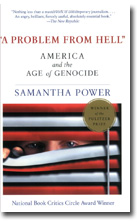Books |
Samantha Power: A Problem from Hell
By
Published: Jun 12, 2013
Category:
Non Fiction
She’s now the President’s choice as Ambassador to the United Nations, but in June of 1989. Samantha Power, just finished with her freshman year at Yale, was working at CBS in Atlanta, preparing sports footage for the news. It was a dream job; she loved sports. Then, on the “feed” — live, unedited footage, broadcast only within the network — she saw Chinese troops attack students in Tiananmen Square. It was the most shocking thing she’d ever seen. And she thought, "Oh, my God. What am I doing with my life?"
At Yale, she sharpened her focus, studying History and training herself to write. She graduated from Yale Law, got a job at a foundation. But something nagged at her, so she went to Bosnia and became a correspondent. And, again, she was stunned. She saw the blood of murdered children, heard the accounts of the wholesale slaughter of Muslim men in football stadiums.
When Power returned home, she saw Holocaust memorials and remembrances and heard the talk of "never again." And she asked herself: "How can it be that the Bosnian Muslims differ from past victims of genocide, who presumably, somewhere along the line, must have been aided for us to say ‘never again,’ as if we meant it?"
She came to a terrible conclusion: "It took about thirty seconds to realize that we had actually never aided the victims of genocide, never owned it as a foreign policy priority."
Which led her to the ultimate question: "Why? Not only why does this happen, because all the time there are gaps between promise and practice, but what are the stories that we’re telling ourselves so that we’re living with this dissonance without experiencing it as dissonance?"
The answer is a giant of a book. "A Problem from Hell" won the 2003 Pulitzer Prize and the National Book Critics Circle Award for general non-fiction, and the Council on Foreign Relations’ Arthur Ross Prize for the best book on U.S. foreign policy; for her New Yorker article on the horrors in Darfur, Power won the 2005 National Magazine Award for reporting. In a word, she’s the world expert on genocide.[To buy the paperback of "A Problem from Hell" from Amazon, click here. For the Kindle edition, click here.]
Power’s findings will cheer no one: Americans lack the imagination to recognize evil. We don’t want to believe that civilians are at risk in war zones. No one effectively pressures our politicians to do anything about genocide. To deaden our guilt, we note that atrocities occur on both sides, and we brand anyone who’s really upset as "emotional." And "no U.S. president has ever suffered politically for his indifference."
The proof comes in the form of stories, accounts of people who tried to stop genocide and how they fared. Power starts with the Turkish slaughter of Armenians. That’s history, and no secret. Power’s genius is to transition from these massacres to the story of Raphael Lemkin, a 21-year-old Polish Jew, who reads about one assassination in this campaign and wonders why, if it’s a crime to kill one man, it isn’t to kill a million. He becomes a lawyer, obsessed with the legal implications of slaughter. And then Hitler invades Poland.
His parents won’t leave. Like others, they trust Hitler to be rational. Lemkin flees to Sweden, gets a position teaching international law at Duke and comes to America. Here, he starts a one-man crusade to alert President Roosevelt and his aides that the Germans are exterminating Jews. But no one can see what he does. Churchill notes, "We are in the presence of a crime without a name."
Lemkin begins to search for a single word that will convey the magnitude of these crimes. At length, he creates one — genocide, partly from the Latin for "race" or "tribe" and partly from the Latin for "killing." A short word. Novel. Maybe, he hopes, unforgettable.
Lemkin works tirelessly to create international laws against genocide. In 1948, the United Nations adopts a human rights treaty. Reporters look for Lemkin, to tell the story of his 15-year struggle. They find him in the darkened assembly hall, weeping. "Let me sit here alone," he begs, overcome by the years of work and the memory of murdered relatives.
Lemkin’s epic story had me — and will have you — in tears. But it’s only the beginning. The word "holocaust" did not appear in The New York Times until 1959. The 1961 film, Judgment at Nuremberg, contained only a few references to Jews. "It was not really until the 1970s," Power writes, "that Americans became prepared to discuss the horrors."
By then, there were fresh horrors. Power has compelling narratives about all of them: Cambodia, Saddam’s Iraq, Rwanda ("the fastest, most effective killing spree of the twentieth century"), Bosnia. No one comes off well. Fans of Bill Clinton will especially wince.
So what does "never again" really mean, Power asks. This: "Never again would Germans kill Jews in Europe in the 1940s." But this is not to say that American policy failed. "The U.S. record is one of success," Power concludes, with dry bitterness. "Troubling though it is to acknowledge, U.S. officials worked the system and the system worked."
Could anything be different? Power quotes George Bernard Shaw: "The reasonable man adapts himself to the world. The unreasonable one persists in trying to adapt the world to himself. Therefore, all progress depends on the unreasonable man."
Power’s stories are devastating, her research exhaustive. To read her is to be a candidate for "unreasonable." Consider yourself warned.


